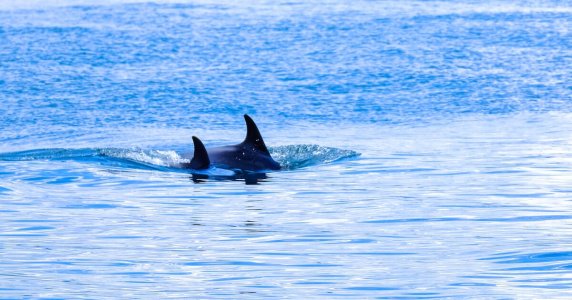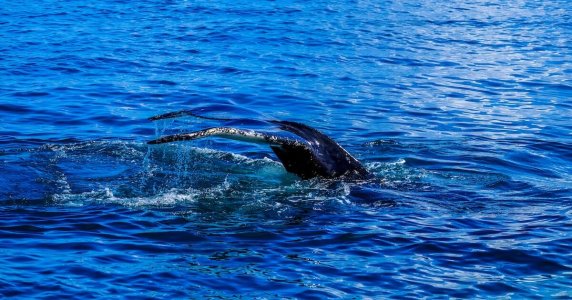International pressure increases as shocking footage reveals gruesome whaling tradition
- Replies 20
Warning: Distressing content. Reader discretion is advised.
In a scene that could be mistaken for a tourist show, a swimmer expertly rides a small pilot whale by clutching its fin.
But after a few seconds, his colleagues shove a metal spike into the animal’s spine – and the water turns red with blood.
This footage comes from Europe's annual whale slaughter, which takes place off the Faroe Islands.
The video shared online is from May 8, 2023, but the grindadráp, or whaling hunt, is a tradition that dates back hundreds of years.
Samuel Rostol, a Norwegian-born activist who captured the video, shared his experience of witnessing multiple grindadráp events.
He accumulated footage while working with Sea Shepherd UK, an organisation that aims to put an end to this tradition.
‘In front of us, 100 bodies of an animal whose sibling affected my childhood so strongly — Flipper — were being pulled out of the water and slapped down on the harbour to be cut open and butchered,’ Rostol told reporters.
‘The scene was absurd as their deaths were unnecessary.’
In 2021, an entire mega-pod was herded into shore, and 1,423 dolphins were killed.
However, as shocking as the video is, marine mammal biologist and Faroe Islands native Bjarni Mikkelsen said his community's traditions were being unfairly targeted.
He argued that the grindadráp is no more barbaric than the practices of slaughterhouses in Europe, the United States or Australia.
‘It's much easier to hide what's happening in your own backyard just by pointing to others,’ he said.
In defence of the tradition, Mikkelsen explained that the Faroese continue to follow old customs like slaughtering sheep at home or shooting rabbits in the mountains.
He insisted that hunting whales is no different – it has been done for generations as a source of food.
‘It just has to be done in order to get our food. There is no more to it than that...It's very bloody, it's outdoors, and we don't hide anything. Because, in my opinion, most of the Faroese are very proud of this practice,’ he added.
Those against the practice argued that the killing methods were ‘cruel’ when compared to modern slaughterhouses, which have more oversight from inspectors and don’t kill mammal species in front of each other, as it causes significant stress for the animals.
However, Mikkelson explained that killing methods have improved.
‘I don’t know how many millions of sheep are killed in Australia each year, but we kill 600 dolphins on average efficiently,’ he added.
John Hourston from the UK-based conservation group Blue Planet Society shared his thoughts on the grindadráp tradition. He reminded everyone that many of these cetacean species are otherwise protected under EU regulations and that the world is in the middle of a biodiversity crisis.
‘Why is a rich country, with a dozen supermarkets and a globalised supply chain continuing to harm wildlife in such a cruel way?’ He asked.
Hourston called on countries that import fish from the Faroe Islands to pressure the island's inhabitants to stop the whaling.
‘If they want to get it stopped, they could. It's really just a question of political will,’ he stated.
However, the locals are adamant that international pressure won't change their ways and that a change in tradition must come from within their community.
 Members, we’d love to hear your thoughts on this difficult and sensitive issue - let us know in the comments below.
Members, we’d love to hear your thoughts on this difficult and sensitive issue - let us know in the comments below.
In a scene that could be mistaken for a tourist show, a swimmer expertly rides a small pilot whale by clutching its fin.
But after a few seconds, his colleagues shove a metal spike into the animal’s spine – and the water turns red with blood.
This footage comes from Europe's annual whale slaughter, which takes place off the Faroe Islands.
The video shared online is from May 8, 2023, but the grindadráp, or whaling hunt, is a tradition that dates back hundreds of years.
Samuel Rostol, a Norwegian-born activist who captured the video, shared his experience of witnessing multiple grindadráp events.
He accumulated footage while working with Sea Shepherd UK, an organisation that aims to put an end to this tradition.
‘In front of us, 100 bodies of an animal whose sibling affected my childhood so strongly — Flipper — were being pulled out of the water and slapped down on the harbour to be cut open and butchered,’ Rostol told reporters.
‘The scene was absurd as their deaths were unnecessary.’
In 2021, an entire mega-pod was herded into shore, and 1,423 dolphins were killed.
However, as shocking as the video is, marine mammal biologist and Faroe Islands native Bjarni Mikkelsen said his community's traditions were being unfairly targeted.
He argued that the grindadráp is no more barbaric than the practices of slaughterhouses in Europe, the United States or Australia.
‘It's much easier to hide what's happening in your own backyard just by pointing to others,’ he said.
In defence of the tradition, Mikkelsen explained that the Faroese continue to follow old customs like slaughtering sheep at home or shooting rabbits in the mountains.
He insisted that hunting whales is no different – it has been done for generations as a source of food.
‘It just has to be done in order to get our food. There is no more to it than that...It's very bloody, it's outdoors, and we don't hide anything. Because, in my opinion, most of the Faroese are very proud of this practice,’ he added.
Those against the practice argued that the killing methods were ‘cruel’ when compared to modern slaughterhouses, which have more oversight from inspectors and don’t kill mammal species in front of each other, as it causes significant stress for the animals.
However, Mikkelson explained that killing methods have improved.
‘I don’t know how many millions of sheep are killed in Australia each year, but we kill 600 dolphins on average efficiently,’ he added.
John Hourston from the UK-based conservation group Blue Planet Society shared his thoughts on the grindadráp tradition. He reminded everyone that many of these cetacean species are otherwise protected under EU regulations and that the world is in the middle of a biodiversity crisis.
‘Why is a rich country, with a dozen supermarkets and a globalised supply chain continuing to harm wildlife in such a cruel way?’ He asked.
Hourston called on countries that import fish from the Faroe Islands to pressure the island's inhabitants to stop the whaling.
‘If they want to get it stopped, they could. It's really just a question of political will,’ he stated.
However, the locals are adamant that international pressure won't change their ways and that a change in tradition must come from within their community.
Key Takeaways
- Footage of the annual whale slaughter off the Faroe Islands in Europe has drawn criticism, with activists calling for the tradition, known as grindadráp, to be banned.
- The footage shared online showed a small pilot whale being ridden before it was brutally killed, causing the water to run red with blood.
- Faroe Islands natives argued that their tradition is no different than what happens in slaughterhouses worldwide and that methods used to kill the whales have improved.
- Advocates for ending grindadráp said it is a cruel practice that must be stopped, calling for international pressure on the Faroe Islands to bring about change.









